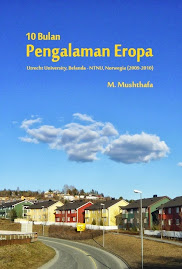
Those articles explore various themes on applied ethics, reflecting the wide scope of applied ethics and its place in the discourse of philosophy. From the first page, I can feel that this book is a kind of academic book. But the most important thing, this book really gave me a thought-provoking warming up before the course is kicked off. This book inducted me to the interesting discussion on applied ethics.
The first essay, written by Bo Petersson (Professor of Philosophy, Linköping University), invited me to a deep and radical reflection about the ethics. Professor Petersson examined his reflection with critical reviews and analysis on the essay of Paul van Tongeren, “On the Beginning of Ethics” (in G. De Stexhe & J. Verstraeten (eds.), 2000, Matter of Breath, Foundations for Professional Ethics, Leuven: Peeters). In fact, I couldn't read the original and complete version of this essay—I don't have access to the book. But it's not a problem. I could still follow the clear explanations.
The essay of van Tongeren itself actually is an analysis of Book I of Plato's Republic about the birth of ethics. And Petersson emphasized and analyzed van Tongeren's with some critical reflections. I got, at least, three important points from this chapter. First, about the birth of ethics. Reflecting on Plato's text, Petersson underlined that there was a moment when ethics was born. By ethics, it means ethical reflection both meaning reflection within ethics and reflection about ethics (meta-ethics). There is such situation when ethical reflection doesn't needed. Van Tongeren mentioned about archaic period, it's about period before 600 BC, when society and the rules were static and they were not questioned.
In the classical period, from 600 BC to 300 BC, the static society breaks up. Through wars and expanding trade, people became aware of other cultures and other habits and systems of evaluation. On this intense interaction of people, the meaning of the moral concepts were questioned, and this inquiry constitutes the beginning of ethics. The breaking up event of this socio-cultural situation might be started in the level of individual.
I have two important questions on this point: first, is there such a group of people right now living in a social conditions when people had a fixed place within a society and they don't need ethical reflection? Second, what is the feature of fundamental changes in society that make the ethical reflections being important?
The second point of this article is about the threat to ethics. Relativism and traditionalism threaten ethical reflections with different strategies. Both relativism and traditionalism render ethical inquiries as an activity (inquire, ask) meaningless. Relativism believes that there are no true and definitive answers to meta-ethical questions, and traditionalism believes that the authorities know the answers to meta-ethical questions and we also know them through the authorities. So, the threat of ethics is such situation that make the reflections useless.
Just like my second question on the first point, we also could explore this second point criticizing the situation when the ethical reflections are necessary.
The last point of this article is about the deep meaning of ethics itself. If our inquiry leads us to an answer which we have all reasons to believe to be true, that would mean the end of our inquiry. Is the ethics, as an activity, would be ended on this point? I think that this point, once again, examine our understanding of ethics and ethical reflection. In my mind, maybe this is an entry point to applied ethics. Ethics, and ethical reflection, have strong relation to the practices in our every day life. There will be an intense interaction between moral concepts and our understanding to factual life. On this point, I feel that Professor Petersson have invited us to the real field of challenging applied ethics.
The second article by Professor Göran Collste (Linköping University), the MAE Programme Coordinator, carried on the access to applied ethics by giving us clear and brief description about applied and professional ethics. Three point was emphasized concerning the rise of applied ethics: wide spread of secularization characterized by moral autonomy of individual, new moral problems facing the society due to new technical possibilities, and philosophical response to a new social situation. Professor Collste wrote that applied ethics appeared when ethics itself was in decline—that was in the 1960. Applied ethics as the art of reflecting in moral dilemmas and moral problems indicate a turn from descriptive ethics to normative ethics. I remembered, Kees Bertens mentioned applied ethics as a contemporary development of normative ethics in his book, Etika (Gramedia, Jakarta, 2002).
Professor Collste asserted that applied ethics not just the application of ethics to special arenas of human activity. It implies interplay between theory and practice, between experience and reflection and between intuitions and principles. To describe this in detailed explanation, Professor Collste tried to discuss about early born babies, so called neonates, using applied ethics framework, particularly reflective equilibrium of John Rawls' theory as a method. In this example, Professor Collste clarified how this method works: structuring argumentation in applied ethics, for decision making, or for justification.
Second part of the article explained about the professional ethics, a moral reflection in work that has its basis in the practice of a profession. Professional ethics contains two parts: the common goal of the profession, and rules for behaviour. It function is as a guide to the professionals facing difficult moral decision and as a reference for those professionals who want to act fairly.
I found something interesting on this part of the article, especially concerning my recent activities as a teacher in a rural school religious communities. The complex of crisis haunted in my contemporary social condition of my country has also seen as a failure of system of education. Educational institution have failed to response the challenge of the age so we only have the leader with egoistic and narrow vision, people has a minimum solidarity toward poor people, and so on. Teacher, as a key actor on educational institution, has a weak and peripheral vision on his profession. It seems that the guide for their activities now is not a clear vision of their noble profession.
I anxiously reflect this point based on my experiences. If the ethics itself always be connected with concrete moral dilemmas, now I feel that the moral dilemmas could be not only as “concrete” or explicit one. The significance of professional ethics might be clear in the long term and broader context.
The Third article, “Ethical Pluralism” by May Thorseth (NTNU), seems to give additional explanation about threat to ethics as Professor Petersson explained, focusing on relativism. Thorseth made clear why relativism epistemologically and morally problematic. As we know, moral relativism recognized that we get a plurality of different standard of justice. Moral claims are true only relative to some standard of framework. So, moral relativism has the lack of common standards for judging between different cultures. Hence, moral relativism allow for the rise of two opposite views of the same action.
If we back to the explanation of Professor Petersson, we underline that this situation make the ethics as activity has no significance.
I think the key problem of moral relativism concerns with different moral values and judgments in different society and culture. Thorseth then discussed how we considered the differences. Thorseth differentiated moral relativism and value pluralism. Value pluralism is the root of ethical pluralism as a third alternative between relativism and absolutism—another threat of ethics. Value pluralism recognizes the differences, respects other moral values, but still makes an appeal to some moral claims. Value pluralism leaves open the possibility to interfere another moral system when it is in fact not good. In this context, tolerance and respect was put on positive meaning. Abstaining from substantive judgment could be a kind of moral relativism.
The next chapter written by Marcel Verweij (Utrecht University), “Moral Principles and Justification in Applied Ethics”. In this article, Verweij explored the roles of principles in moral theory in applied ethics. The important conclusion in this article is: that it is a misunderstanding of moral principles and ethical theory to see principles as devices designed for answering moral problems. There must be a great effort to do to achieve moral judgments—not only by basing a principle upon a particular moral case.
Moral principles are to much general or abstract to provide practical guidance in decision making. In addition, a different principle could point to another directions of moral stand. Verweij tried to place the moral principles in a proportional role. Moreover, Verweij implied that applied ethics and ethical reflection will be a challenging and complex enterprise. The main feature of philosophical way of thinking should be invited to help us to achieve better result. So, it is obvious that in applied ethics, interpretation and critical thinking also have a great importance to be maintained.
If the first four chapters of this book give a general and rather theoretical perspectives on applied ethics, the last three chapters focused on particular concern of applied ethics. The article of Professor Frans W.A. Brom (Wageningen University) highlights the interplay of concrete legislation and public morality based on the case of animal protection legislation in the Netherlands. Professor Brom put forward the expressive-communicative function of legislation, that constitutes an audience in society. Individuals in society become an audience because they share a certain language. The legal framework pre-structures the moral discussion and moral deliberation.
Professor Anders Nordgren (Linköping University) wrote about the interdependence of ethics and science. One important idea explored here is about moral responsibility of scientist, and Nordgren put forward three aspects of this: responsibility “of”, “to”, and “for”. Who is responsible in science? To whom and to what are scientists responsible? For what are scientists responsible? Nordgren also asserted that scientists responsible for the application of the science as well.
The last chapter, written by Rune Nydal (NTNU), is about the social contract between science and society. The discussion on this chapter focuses on the interaction between epistemic aspect and ethical-political aspect on the development of science. Philosophical discourse, mainly on applied ethics, had tried to clarify the conditions for true scientific activity on the one hand and true political activity on the other hand. Nydal asserted that education has an important role to enforce and adjust the ideals of this social contract.
Reading this book with an in-depth approach will give the reader an orientation to applied ethics as a new developing discipline in philosophy. Our runaway world affected the relation and interaction of people, and it aroused new question on various problem of ethics—not only about relation between people, but also with animal and nature.
Selasa, 01 September 2009
An Orientation to Applied Ethics
Label: :: In English ::, Ethics, European Adventures, Philosophy
Langganan:
Posting Komentar (Atom)














1 komentar:
more and more you will get the better english by this articles. i found u so hard to study bro till u get chance to go aboard
Posting Komentar